
Sir Harry Hotspur of Humblethwaite (1871) is Trollope’s most comfortless novel, and also the one with the most alliterative title (almost impossible to pronounce reliably after half a glass of sherry). Following the tragic death of his son and heir, Sir Harry Hotspur is forced to rewrite his will. The glorious title must go to his cousin, a useless article called George Hotspur, but Sir Henry is determined that he shouldn’t also get his wealth. He bequeaths all his property to daughter Emily, hoping that she will marry a decent chap prepared to take his wife’s name. Alas, Emily is a feisty minx who refuses to marry the chinless wonder her parents have chosen, instead falling in love with the feckless George.
Although aware that George isn’t exactly a pillar of the community, Emily is convinced that he requires only her love in order to effect a Damascene conversion. George is fond of her in his own way, but sees her as little more than a cash cow and an expedient means of settling his stratospheric gambling debts. His true affections lie with hard-working actress Lucy Morton, of whose earnings he regularly avails himself. Evidence of his roguery abounds, but he sets himself the Herculean task of convincing Sir Harry that he is a suitable husband for his only child. Sir Harry fears that George will give Emily venereal disease and be “endangered by the marriage”. Consequently, he insists that his prospective son-in-law is effectively quarantined before giving his blessing, as situation George finds unbearable.
In his Autobiography, Trollope wrote that Sir Harry Hotspur of Humblethwaite (1871) “…had for its object the telling of some pathetic incident in life rather than the portraiture of a number of human beings.” As such, it is among his single-issue novels, with a limited cast and tight focus. Trollope rummages around in the consciousness of George, a character for whom he has no love:
“He was able, though steeped in worthlessness, so to make for himself a double identity as to imagine and to personify a being who should really possess fine and manly aspiration with regard to a woman, and to look upon himself as that being.”
The author’s sympathy is reserved entirely for the women who George mistreats, believing bigamy to be the ultimate solution to his problem: “A man might be fond of two dogs, or have two pet horses, and why shouldn’t he love two women!” He might then have the best of both worlds: Lucy Morton indulges his love of tobacco, alcohol and gambling, whereas the refined, but wealthy, Emily Hotspur takes a dim view. Emily’s spirited defence of her wastrel cousin is difficult to fathom; possibly it presents a rare opportunity for her to exercise autonomy.
Emily exists purely to continue the Hotspur line, destined to become utterly inconsequential should she produced an heir. Sir Harry’s dead son is far more important to him than his living daughter. Lucy is “added to the list of women who have sacrificed themselves on behalf of men whom they have known to be worthless.” Both end up thoroughly miserable, thanks to the selfishness of one man. A furious Trollope denounces him as “a brute, unredeemed by any one manly gift; idle, self-indulgent, false, and without principle.” The ending is poignant, but utterly bleak.
While the emotional intensity of Trollope’s writing is remarkable, the concomitant misery is almost unbearable in places. Rarely does Trollope present a male protagonist without a single redeeming feature – he lays on the wickedness with a trowel. As the story was serialised when the Married Woman’s Property Act was making its way through Parliament, Trollope was perhaps more mindful than ever as to the inequitable position of wives. Lucy’s property must be ceded immediately to a husband, and Lucy Morton works tirelessly to support an indolent parasite. An aristocrat is compared unfavourably with an actress, a profession at the very bottom of the Victorian social scale. Trollope’s writing is almost Dickensian in its polemicism, and rendered unforgettable by its brutal realism.
Sir Harry Hotspur of Humblethwaite by Anthony Trollope